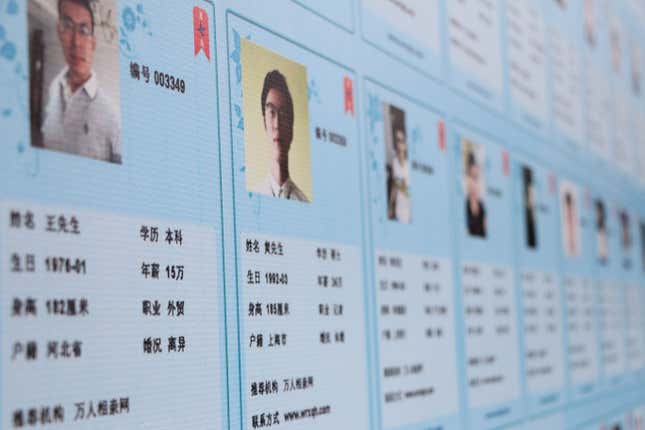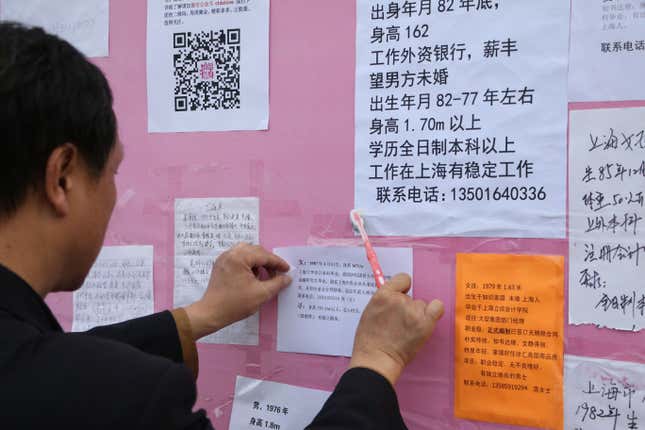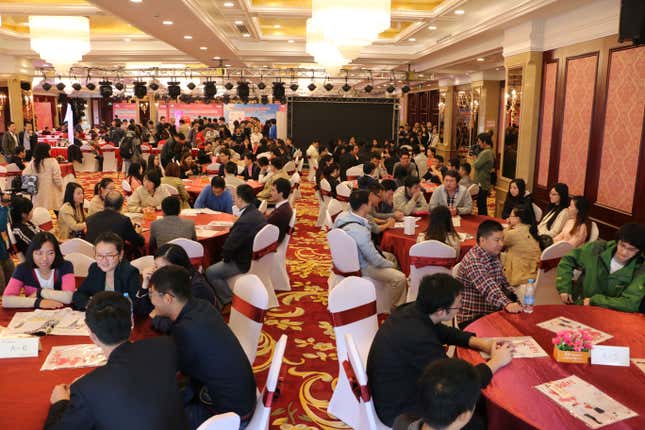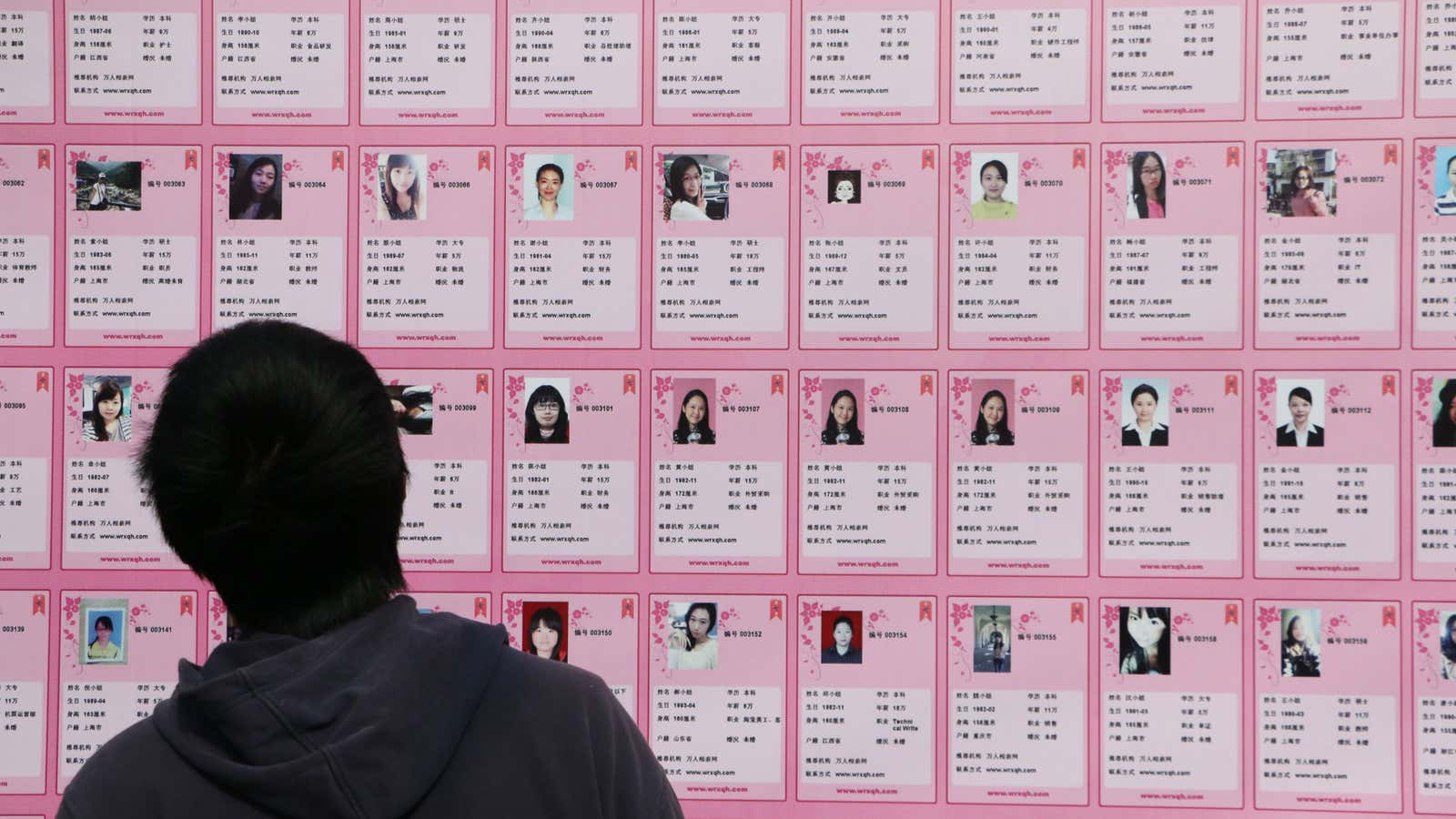Shanghai’s seventh annual “Love and Marriage Expo” was held in Aima Palace, in the northeastern suburb of Baoshan—the district where I live. The palace and surrounding park were designed to hold Western-style wedding ceremonies, but on this October day, over 4,000 single people under 40 were amassed there, looking for their other halves.
As a 23-year-old only child from a working-class family from Shanghai, I am in no rush to find a girlfriend. But marriage at a young age in China is considered the norm right now. My parents certainly think it should be. Since I got a job, they’ve now and then asked me euphemistically, “Do you have a direction?” By “direction,” they mean a girlfriend—one with whom I’m in a stable and serious relationship, and can bring home to visit at the Chinese New Year.
My mother didn’t force me to go to the matchup event. She just hinted that I should—every time we talked on the phone. “Nothing wrong with just having a look,” she told me. So here I was, dressed decently, and looking at a huge noticeboard, on which I saw my picture alongside hundreds of others, and below it the words:
Name: Mr. Huang
Education: Master’s degree
Birthdate: March 1992
Yearly salary: …

I’m listed on the wall for buyers.
I had filled in my yearly salary when I’d registered online—it’s a required question, along with those about your height, weight, zodiac sign, and whether you have a property or own a car. But I didn’t expect they would make rows and rows of “wanted” posters for every participant with his or her salary visible to every passer-by.
By my count, there were about 2,000 males and 2,000 females listed on the wall, but women still outnumbered men at the event. As I was reading some of their cards, a girl caught my eye. Looking like she was in her 20s, she had long, nicely dyed brown hair, and was dressed in a denim shirt and black leggings, sort-of Korean style. We looked at each other. She approached me.
“Hey, what year were you [born]?” she asked me in Shanghai dialect. The way she said “hey” was not very polite. I felt like a drunk driver being interrogated by a police officer on a highway. “In 1992,” I replied.
It turned that I was indeed on a highway: She ignored me and passed right by. “What year were you born?” I called to her back. She kept walking, and replied “I’m almost a circle older than you.”
“A circle” means a 12-year circle of Chinese zodiac animals. She felt I was too young to be a dating prospect—so she didn’t even want to waste a second on me.
Marriage marketing
The more I explored the expo, the more it seemed that everyone—whether they were men or women looking for partners, or their parents, or matchmakers at the 40 agencies that had set up booths at the event—was efficient, focused, and single-minded (except maybe me).
On walking into the palace, I had been year-checked by several mothers, who all turned away after learning that I was born in 1992. Matchmakers dragged me into their booths to register me as a client, and as I repeatedly wrote down my personal information, they were impressed—or at least appeared to be—at my height, my Shanghai hukou (residence permit), my Master’s degree, and my young age. They were all dissatisfied when, on the property question, I told them “My family is going to buy an apartment for my wedding.” But they all comforted me, saying I was still very young, so it shouldn’t be a problem that I don’t own any property yet.
One matchmaker guaranteed she would never charge me a penny, even if I found a date with her agency. She said the ordinary charge for a woman ranged from several hundred to several thousand yuan, and the agency wouldn’t take care of her for longer than six months. But as a man I was a “precious resource,” she said. She told me her agency had a staggering gender ratio: one male to four females.

This may seem odd. After all, by 2020, China is expected to have 24 million more men than women aged 20 to 45. An economics professor recently proposed women be allowed to marry more than one man to curb the imbalance. But in China’s biggest cities, and particularly among its college educated youth, the opposite seems true—there seems to be a huge surplus of young women who want to get married.
I think that’s because most Chinese people want to have a marriage that is evenly matched in terms of property, education, or cultural background. That’s especially true in Shanghai, which, despite being a very international city, is often criticized as being not welcoming to “outlanders” from other parts of China.
The desire for a well-matched marriage means young Chinese women in cities have a limited pool of “suitable” men, as these women themselves tend to have a high levels of education, decent jobs, and their own tastes and hobbies. At the same time, the norm of a young marriage and a social stigma against “left-over women” (those unmarried after the ripe old age of 27) pushes women into the marriage and matchmaking markets.
A recent nationwide survey shows the average age of marriage in China is 26. Over 90% of women in China are married before age 30. In the post-1990 generation (mine), the average marriage age is even lower, at 24.
At the red tables
It wasn’t that I didn’t want to talk to girls at the expo. But it was awkward in crowded places with interference either from matchmakers who preferred any communication to happen via them, or from the girls’ parents, who would probably question me for not having property.
So I signed up for an event called “Find the right one at the red tables.”

The event was introduced as a special design for Asian people who are too shy to start conversations with the opposite sex. It was basically an assembly line. Five men and five women would sit around a table covered with red cloth, and chat for six minutes. Then all five men would switch to another table, in clockwise order. There were 10 tables altogether, so each session took an hour.
This, then, was the official way to have a nice, thorough, personal conversation with someone you liked.
After 100 participants, including I, had sat down, the host began to pick one person from each table to introduce himself or herself. One girl said she didn’t want to make her salary public. “Drop your reserve,” the host told her, “otherwise you’ll find no one.”
The host kept reminding the men that he needed to hear two things—property and salary. A guy in his 30s, who worked at the headquarters of Bank of China, said, with false modesty, “I don’t earn too much, just 300,000 to 400,000 yuan [$47,000-$63,000] a year.”
Over the course of the next hour, I did have some conversations with girls around my age. Some were nice, others were just awkward.
#1 Ms. Xu, 1993, from Yancheng, Jiangsu province
After more than 60 seconds of awkward silence, Xu was still staring at a brochure on the table and seemed to have no intention of talking either to me or to the other guy sitting next to her. “How come you’re here?” I asked, to break the ice. She told me she was forced to come by her mother and aunt, both of whom had come with her.
I said I was more or less in the same situation. We talked about our hometowns, universities, and occupations. (I’ve already forgotten hers). Then I ran out of topics. She remained more interested in the brochure than in me. We friended each other on WeChat. About an hour after the event, I saw her post a status update: “That was so stupid.”
#2 Ms. Xu, 1990, from Shanghai
Xu was an attendant on the Shanghai subway. She loved watching movies, shopping, and playing badminton. Her work involved charging commuters who wanted to add value to their transport cards, and supervising “villagers” when they examined and repaired the trains outside operating hours.
“Villagers” was a contemptuous word she used to refer to outlanders who came to work in Shanghai. She said she would only like to date Shanghainese. She kept on talking with me in Shanghai dialect though I tried to reply in Mandarin, which I thought was more appropriate at an event full of people from all over the country. A guy from Shandong province wanted to join our conversation, but couldn’t understand us. “Huh,” he said, “you are all Shanghainese.”
#3 Ms. Fang, 1992, from Shanghai
Having just graduated, Fang now works as a biology teacher in a key high school in Shanghai. She didn’t want to come to the expo, but her mother asked her to. I said I had been interested in biology back in high school and mentioned a question that told you the genes of the parents and asked her to calculate the probability of a child having double-fold eyelids. She was impressed. A bored older woman at the table, who had nobody her age to talk to, said, “You guys look like a couple.”
#4 Ms I-didn’t-even-ask-her-name, 1990, from Shanghai
The reason I didn’t even ask her name—and she didn’t ask mine—was that she said she only considered men who were “at least four years older.” I asked why. She said she thought guys her age were too immature and inconsiderate, judging from her past relationships. She joked that I was too young and should go hunting for a date on a university campus.
At the end of the day, I met a nice mother…
After the exhausting hour-long roundtable talks, I walked out of the venue. I tried to look for the biology teacher, but I didn’t see her. I thought I should call it a day.
But one person was waiting for me—Ms. Chen, the mother of a 22-year-old daughter. She had come up to me earlier when I was grabbing a bite in a square where a love-song singing contest was being held. Only one guy had gone on stage, and he was completely out of tune. No one was listening.
From that talk, I’d already learned a lot about Ms. Chen’s daughter. She was a 22-year-old college graduate in computer design, and now worked for a startup developing a Japanese mobile app game. She was very obedient, Ms Chen said, and wouldn’t easily get into a casual relationship, as other girls might. Her mother also let me glance at her daughter’s selfie—one that had apparently been overly beautified by Meitu Xiuxiu, a popular photo-editing app .
Ms. Chen said she had been looking around but hadn’t encountered any guys who might be suitable for her daughter. She would like to know more about me. But there were some things she needed to check first.
Did I mind that her daughter had graduated from a college for professional training but not a university? I said no.
Did my parents and I mind her daughter was not from Shanghai, but from Wuhan in central China? I said no.
Finally, how often would I come back to Shanghai and where would I live in the future? I said I didn’t know. It depended on me and my other half.
She seemed satisfied. We exchanged phone numbers. I offered to friend her daughter on WeChat, but she said she would prefer to talk to her first. And that I should talk to my parents first as well, to make sure her daughter and her family’s situation met with their approval.
I asked Ms. Chen why her daughter hadn’t come herself. She said her daughter was too shy for this kind of occasion. “Children are never in a rush, but parents are,” she said.
I understand my parents’ wish to see me settle down. They married when they were 30 and gave birth to me only two years later. Some of their friends already have grandchildren. They are about to retire, and they picture buying an apartment for me in Shanghai, helping my future wife and me clean the house, cook dinner, and take care of our child (or hmm, two children). They don’t mean to push me into carrying on the family line; they just want to have three generations living together, a pleasure already enjoyed by many other people in their 50s in China’s cities.
But when I went back home, I didn’t tell my mom about Ms. Chen’s daughter, or any other girls I met. I just said “No one interests me.” I want to find a girlfriend by myself and get to know her charms, through dinners, hangouts, or gatherings of friends, rather than at a matchmaking meetup where parents’ from both sides approve our relationships based on our education, hukou, property, or salary. If I can’t find someone this way, on my own, maybe I’ll return to the matchmaking market a few years down the road—perhaps when I’m 26.




